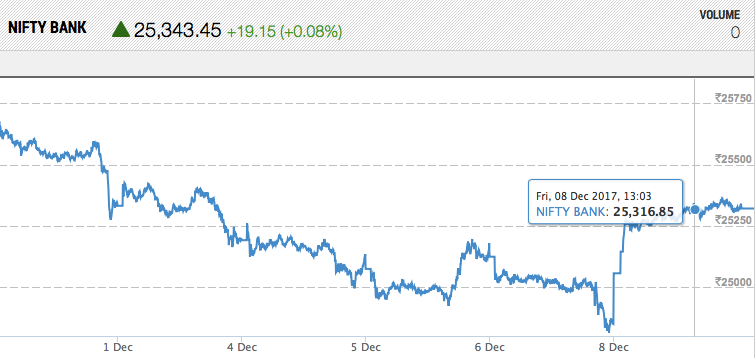In the current Indian bull market, banking stocks have been driven by government’s move to recapitalise, see some top picks from the sector that you can’t afford to miss.
India had witnessed a whopping growth in household savings, starting FY 2006. A major percentage of income is either left as bank deposits or invested through fixed income products like Fixed Deposits and Provident Funds. If stock markets are analyzed in terms of Bank Index and underlying bank stocks, the picture has taken a vibrant turn in recent times.
The Bank Nifty in the last one week has showcased a decline of 356 points. The 50 day moving average for the index stands at 24,998 throwing an average of around 25,000 with a much higher 52-week high of 25,953.
Recapitalization – The Untold Story
Recent news of how the government has been planning on pumping close to Rs. 2 trillion in the banking sector over the next two years, had economists thinking. Bank recapitalization will be carried out via budgetary allocations, through equity markets and predominantly by issuing “Bank Recapitalization Bonds”. The index climbed to unexpected levels in October following the announcement and has helped banks recover stock losses, in a few trading sessions.
Public Sector Banks (PSB’s) have largely remained surrounded by various issues pertaining to bad loans and in turn making way for non-performing assets (NPA’s). Recapitalization through budgetary allocation will obstruct government’s free flow of funds in constructive sectors and thus hamper fiscal deficit. The Finance Ministry is of the view that pumping money and recovering bad loans will solve the issue and help banks to recuperated the huge losses that they have incurred.
Top Banking Stocks You Can’t Afford To Miss
Analysts feel the proclamation can help bank stocks make a quick recovery to some extent as NPA’s are almost double the amount being contemplated so far by the government. In contrast many feel that the uptrend maybe short-lived. Market sentiments have largely remained bullish but the effect might not linger enough for investors.
In this bull run mutual funds inclined towards banking and financial sector have jumped on the opportunity and largely bought HDFC Bank and ICICI Bank. Public Sector Banks like SBI and PNB are high on valuation but low on providing value to investors, still providing stable returns. One could invest in the above mentioned stocks seeking high valuation and comparative performance. The industry Price-to-Earnings (P/E) is placed between 35-40x.
All investments in your portfolio must be scheduled on a long-term basis thus inculcating market dynamics and cyclical nature of the banking sector. Banks like Bank of Baroda (BOB), Karur Vysya, Karnataka Banks and South Indian Bank provide lucrative opportunities to enter in this phase and garner returns over a 5-10 year horizon.















